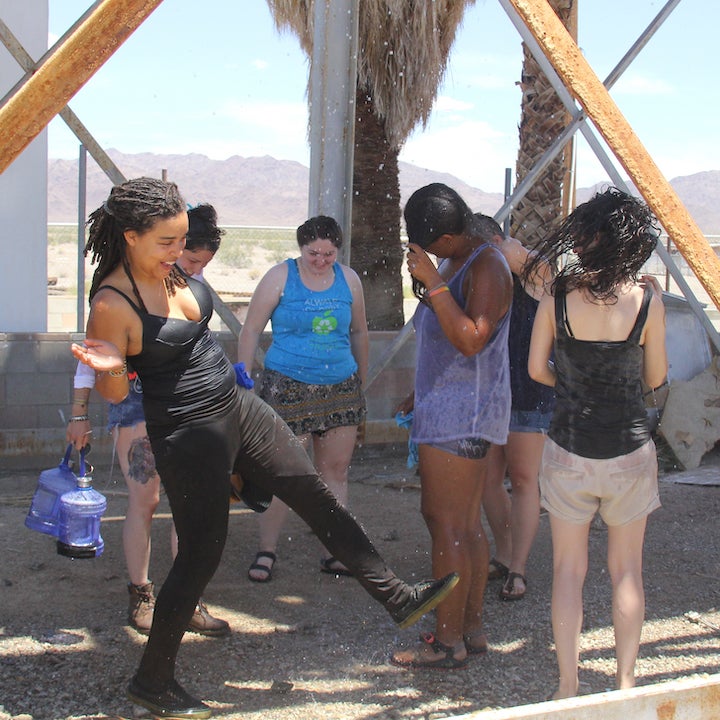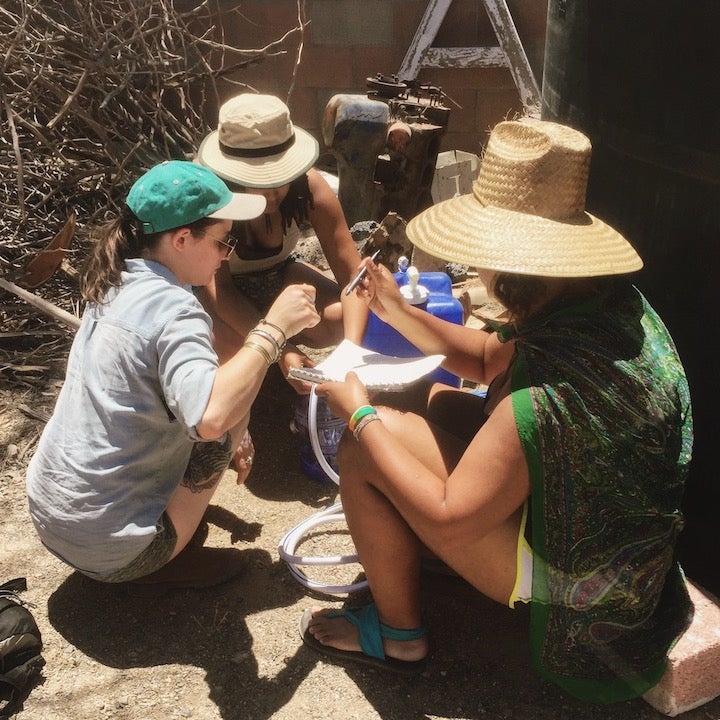A 30-day challenge to become more water wise

Valerie Lyons taking a contemplative walk through Kelso Dunes outside of Amboy, California, in May 2017 as part of the original Drylab 2023 water experiment. Photo courtesy of Krista Davis
Six years ago, eight Arizona State University students and a pair of faculty members traveled to the Mojave Desert in the high summer with an allotment of four gallons of water per day. They stayed for a month. They came back changed in surprising ways.
"We ... ended up creating an amazing bond, community and interpersonal experience," said Adriene Jenik, co-director of Drylab 2023, an art and sustainability-based initiative sponsored by ASU. “Understanding the sacredness of water created a special bond between us.”
Recently all eight of the original participants reunited to share some of what they learned — and to issue a new challenge, one that the average person can reasonably accomplish, as part an effort to change Arizonans' attitudes and their relationship with water.
“What we did was difficult, but it was an amazing experience because it brought about this heightened awareness and attention to every drop of water we consumed,” said Jenik, who is also a professor in the School of Art and a PhD student in sustainability. “The new challenge is to live water wise wherever you live and to see what kind of habits you can actually change.”
It’s called Drylab: A 30-Day Challenge to Live Water Wise.
The new initiative, sponsored by ASU’s Impact Water – Arizona, part of the Arizona Water Innovation Initiative, Desert Humanities Initiative and Center for Behavior, Institutions and the Environment, kicked off Oct. 1.
Participants take an entry survey to learn about their relationship with water and their water footprint. They’ll also receive daily prompts until Oct. 31. The prompts, contributed by the original Drylab 2023 participants and other team members, include water tips, meditations, videos and resources.
According to the Drylab website, direct water usage patterns for Tempe residents are 80 to 100 gallons per day. Direct uses include showers, washing machines, dishwashers, toilets and sinks. Indirect uses, which add considerably more to one’s water footprint, include food production and distribution, clothing production, transportation and electricity generation.
“The 30-day challenge is all about making behavior changes without a top-down approach, and in a productive way,” said Marco Janssen, co-director of Drylab 2023 and a professor with ASU’s School of Sustainability in the Julie Ann Wrigley Global Futures Laboratory. “Hopefully from the engagement work we do, we may learn something that might be working with certain groups because there won’t be one solution for everyone.”
In 2017, the Drylab 2023 partipants enjoy a brief respite from the Mojave Desert heat, which often reached into the triple digits. Photo courtesy Krista Davis
The new challenge evolved out of a yearning to get the original Drylab 2023 participants — Shalae Flores, Willa Gibbs, Sarra Tekola, Krista Davis, Molly Koehn, Cydnei Mallory, Sydney Carlson and Valerie Lyons — back together again to discuss the original 2017 hybrid science-art experiment and the lessons they learned.
On Oct. 1, they gathered at the A.E. England Building on ASU’s Downtown Phoenix campus to discuss the month they spent at an abandoned hotel in Amboy, California, a ghost town an hour north of Joshua Tree National Park.
They remembered how they had no cell phone service or the internet. They had an air-conditioned kitchen to prepare their food, but it didn't really work, and the heat dictated many of their actions and how they spent their time.
After the group watched a 12-minute video recapping their adventure, the memories came flooding back about the dystopian scenario they created for the fictional 2023 world they inhabited. Military enlistment is mandated: no service, no water. So eight “conscientious objectors” chose to flee into the Mojave Desert, where they had to survive on four gallons of water a day and whatever food they could grow.
The stifling May heat, which reached up to 110 degrees during the day, was the first thing they had to contend with.
“Adriene actually got heat sickness and had to leave the site to seek medical treatment,” recalled Tekola, a co-founder of Black Lives Matter Metro Phoenix and the Phoenix Environmental Justice Coalition. “I think that freaked us all out.”
Carlson affirmed it was a crash course in survival with everyone having to decide how they were going to pool and monitor their water, prepare their food, get along and stay cool.
“When I reflect on the program, I think about the difficulties we all were experiencing, and sometimes I forget about some of the beautiful things,” said Carlson, a high school educator in Glendale, Arizona.
"Towards the end of the project we all traveled together to the river, and we all swam together. It was just this amazing connection between us, water and each other.”
For Lyons, the time spent in the desert meant sacrificing for the greater good.
“We had to learn how to negotiate rules to keep people safe, comfortable and happy — as happy as we could be,” said Lyons, an artist and educator.
Gibbs said Drylab 2023 was a dry run for the recent pandemic.
“It prepped me mentally for being able to handle the kind of quarantine surrounding COVID-19 because that was a very stressful time,” said Gibbs, a writer who works at a public library. “The time in the desert and COVID-19 was strangely similar.”
Koehn said Drylab 2023 not only helped her better understand her relationship with water but helped her come to terms with aspects of herself.
“I learned a lot about myself in that experience in navigating the community, especially being an outspoken and very hardheaded person,” said Koehn, an artist and designer whose work focuses on urban structure, expansion and ecology. “I would have never known that and been able to grow to the person I am now. So, it’s great to look back and think about the last six years and how much I’ve grown.”
Mallory said she was “in a bad place” in 2017 but came to fully understand the word “trust” after the experience in Amboy.
“We all come from different backgrounds, and we are all carrying different baggage with us,” said Mallory, who works as an associate teaching professor in ASU’s School of Art. “We had to work through some things and that’s what we had to navigate. And learning to trust one another. You need to learn to trust before you can move in that collective. … It wasn’t until the very end where I started thinking, ‘Where do I meet every person here where they are?’”
Drylab 2023 participants in 2017 during the process of water allocation/dispersal and keeping track through a journal entry. Photo courtesy Krista Davis
Flores said the transformation of the collective is what has stuck with her all these years.
“It went from managing water to building community,” said Flores, an Afro-Latina writer. “These phenomenal women were wonderful and so wise and so skilled and guided me through this process.”
For Davis, who hails from Canada, the experience helped her appreciate the beauty of the desert and to convey to the next generation the importance of water.
“I came into this project in a slightly different place than everybody else because I was living in a cabin off grid in the woods where I hauled my water,” said Davis, a visual artist whose work involves ecological systems. “I already had this experience of knowing how much water I needed a day and how it felt to carry it with me."
Davis, who now lives in Nova Scotia, said she is surrounded by over a thousand freshwater lakes and conservation is not an issue there. But the Drylab experience is something she has never forgotten and she is now passing on her wisdom to her three stepchildren.
“They use water like crazy because they’ve never thought about it, because we live in a place where water is in such abundance,” Davis said. “And so, for me, it’s about how do I teach these kids? This project is about keeping that in mind and connecting those things.”
To learn more about or participate in Drylab: A 30-Day Challenge to Live Water Wise, visit the website or follow on Instagram @drylab2023.
More Environment and sustainability

2 ASU faculty elected as AAAS Fellows
Two outstanding Arizona State University faculty spanning the physical sciences, psychological sciences and science policy have been named Fellows of the American Association for the Advancement of…

Homes for songbirds: Protecting Lucy’s warblers in the urban desert
Each spring, tiny Lucy’s warblers, with their soft gray plumage and rusty crown, return to the Arizona desert, flitting through the mesquite branches in search of safe places to nest.But as urban…

Public education project brings new water recycling process to life
A new virtual reality project developed by an interdisciplinary team at Arizona State University has earned the 2025 WateReuse Award for Excellence in Outreach and Education. The national …



